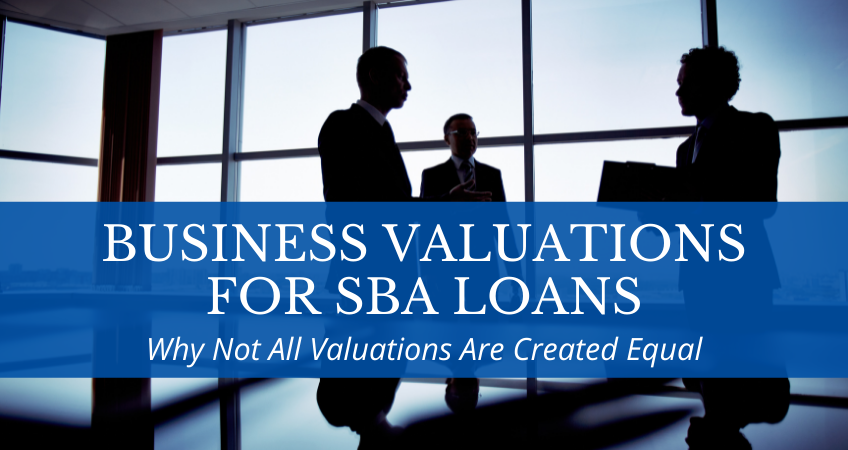
Business Valuations for SBA Loans: Why Not All Valuations Are Created Equal
In any business purchase, it is always critical to arriving at a fair and reasonable price for both the buyer and the seller. As is often the case, the buyer is looking to pay as little as possible while the seller wants to sell for as much as possible. To arrive at an agreement, many business deals utilize third parties in order to arrive at a fair market price. When using borrowed funds, especially those backed by an SBA guarantee, that fair market price must be supported by reasonable assumptions and sound judgment from an expert. However, not all valuations are created equal and the SBA has clear guidelines in their SOP to ensure that valuations are not only sound but also compiled by educated and vetted professionals.
The key consideration when looking at business valuations for SBA loans is ensuring that an “opinion of value” or a “conclusion of value” is rendered in the report, as opposed to a “calculation of value.” According to Neal Patel, Principal at Reliant Business Valuation, Certified Business Appraiser by the IBA, and Certified Valuation Analyst by the NACVA, “Opinion and conclusion of value reports are more in-depth and must contain all three valuation approaches: the income approach, the market approach, and the asset approach.” Patel continues by saying that, “a calculation of value can serve as a basis for an agreement to purchase and may only include one valuation methodology, however, the SBA has deemed that it does not provide enough data and support for appraising value for a third-party appraisal. These can only be used for internal valuation purposes.”
The SBA specifically requires that a third party report state an “opinion of value.” Many appraisers who provide valuations for the SBA are members of more than one certifying body, and therefore may include both opinion and conclusion statements in order to remain compliant with the SBA and their own professional certifying agency. The SBA specifically outlines which appraisal designations and certifying bodies are recognized by the SBA as a “qualified source”.
Those agencies include:
- Accredited Senior Appraiser (ASA) accredited through the American Society of Appraisers
- Certified Business Appraiser (CBA) accredited through the Institute of Business Appraisers
- Accredited in Business Valuation (ABV) accredited through the American Institute of Certified Public Accountants
- Certified Valuation Analyst (CVA) accredited through the National Association of Certified Valuation Analysts
Patel stresses that many business appraisers are also business brokers who may also be earning a fee on the sale of the business. In those instances, the SBA requires that the fees be fully disclosed. However, it is a conflict of interest, and so many will only do the brokering or the valuation, but not both, in order to maintain the above board ethical standards and avoid any potentials issues. This only applies to business valuations. There are different guidelines in place for equipment appraisals, which are discussed in the next post.
If you are looking to purchase a business and have questions about the valuation process or SBA loan options, contact your Salt Creek advisor.

0 comments